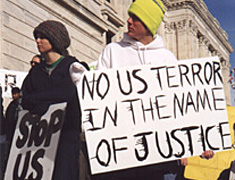
On the seventh anniversary of the attacks on the World Trade Center and The Pentagon, much of the media coverage tends to hover on the same question year in and year out: "Are we safer?" A simple Google search reveals that media outlets from the conservative Heritage Foundation, to CBS News to the progressive Huffington Post have been pondering this query every year consecutively since the tragedy. The question I don't hear being asked: "Are we smarter?"
To answer this question, we should look at the 9/11 generation, otherwise known as Millennials, and ask what the net result in seven years has been on their lives as Americans, and on their understanding of the world. The response will probably be different depending on if you talk to youth from domestically established families versus young people who are new immigrants or the children of immigrants. As a recent Colorlines article describes, the collective reaction to 9-11 sharpened the immigrant debate and many hard working Americans of color were objectified through a racial lens as neverbefore.
The mainstream national response to [September 11] sacralized it, relying on trusty, racialized archetypes of Americans as white and native-born, and foreigners as a dangerous, dark threat. The sacralization process, complete with racist stereotypes, merged with the immigration debate, pitting Americans and foreigners against each other and bolstering the idea that the United States should limit the entry of other people. These archetypes, so prominent in the post-September 11 political discourse, had a narrowing effect on the subsequent immigration debate.
Are young people smarter about immigration issues in America, or have we been fighting the same battles for equality and just reform for seven years? If you were to gauge your answer based on how little was said about the issue a the recent presidential conventions, you'd have to say there hasn't been much progress.
Additionally, many young people have failed to challenge the Department of Homeland Security's xenophobic post-9/11 "special registration" program, which tracks visa entry and departure visitors from certain countries.
According to the Arab American News:
The most controversial part of this program required men from twenty-five predominantly Muslim and Arab countries to report to immigration offices around the country for fingerprints, photographs, and lengthy questioning by officers.
Most young people are taught i their high school history classes about the shame of Japanese-American internment during the Second World War, yet we're tacitly endorsing similar policies in 2008. So, are we smarter?

Are Millennials more savvy about American foreign policy and world events? The past seven years have seen catastrophic situations, including the conflict in Darfur starting in 2003, the 2004 Indian Ocean tsunami and the massive 2008 earthquake in Sichuan, China. Young people have reacted with empathy and generosity towards these events, but have seemingly shown less interest toward war victims in Iraq and Afghanistan. We just haven't seen the same kinds of massive, student mobilizations or debates about American foreign policy and it's violent consequences in the Middle East as compared with campus groups organized for Darfur relief or human rights in Tibet.
That doesn't mean young people aren't conscious or talking about their post-9/11 global responsibilities, but beyond expressing a collective fatigue with Bush's mismanaged wars, young people have some soul-searching to do in regards to shaping our Nation's relationship with Muslim nations, including Indonesia, North Africa and the Middle East.
When we ask the ourselves and our leaders tough question, we become smarter 9/11-conscious citizens. When we question how the Patriot Act affects personal freedoms, especially those of Arab Americans and other communities of color, we become smarter. We can ask these questions in public debates, media editorials in our local news outlets -- and yes, even on Wiretap. In my view, when we are smarter we'll automatically be safer.
